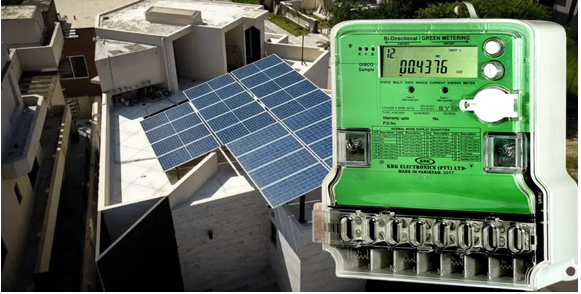INP-WealthPk
Amir Saeed
Pakistan’s solar adoption surges via net metering, incentivised by falling panel costs and rising grid prices.

However, the authorities need to address the concerns about infrastructure necessary for grid modernisation to manage solar fluctuations and ensure grid stability. Pakistan is experiencing a remarkable surge in solar energy adoption, primarily fuelled by favourable net metering policies, as highlighted in the ‘Renewables First’ report, “The Great Solar Rush in Pakistan.”
The net metering system, introduced in 2015, has been a pivotal driver, enabling consumers to install small-scale renewable energy (RE) systems on their premises, effectively transforming them into ‘prosumers’ (both producers and consumers of power). Since its inception, this policy has undergone several amendments to reduce bureaucratic hurdles and encourage broader participation.
Key changes include extending the distributed generation licence from three to seven years and exempting systems below 25kW from the requirement of generation licences. These modifications have made it easier for smaller consumers to engage in solar energy generation. The economic landscape for solar installations has also dramatically improved in recent years.
Global solar panel prices decreased by 42% in 2023 alone, making solar systems more affordable for a larger segment of the population. Simultaneously, the cost of grid electricity in Pakistan has been on the rise, making it increasingly expensive. High-consumption residential consumers now face tariffs of up to 22 cents per unit. This widening gap between the cost of solar energy and grid electricity has significantly enhanced the attractiveness of solar investments.
Furthermore, the regulations that allow the installation of solar capacity up to 1.5 times the sanctioned load under net metering have improved the financial benefits. Consequently, typical solar investments are now breaking even in just 2-4 years, making solar energy an increasingly appealing option for consumers across Pakistan. Dr Fiaz Chaudhary, Chairman of National Transmission and Dispatch Company (NTDC), voiced concerns regarding the current state of the country’s power grid amidst the rapid adoption of solar energy.
He pointed out that the existing infrastructure and regulations were outdated, leading to financial imbalances due to net metering. Solar prosumers, according to Fiaz, are not adequately contributing to grid maintenance costs. Fiaz highlighted a historical oversight in energy planning, where the focus was primarily on base-load power plants without considering demand profiles, which has resulted in operational challenges.
The NTDC chairman stressed that the grid was not designed to handle the flexible generation that solar energy introduces. To address these issues, he called for the urgent integration of smart metering and distributed energy controls to modernise the grid and manage solar power fluctuations effectively. He emphasised that solar energy should complement, not disrupt, the grid.
Credit: INP-WealthPk




